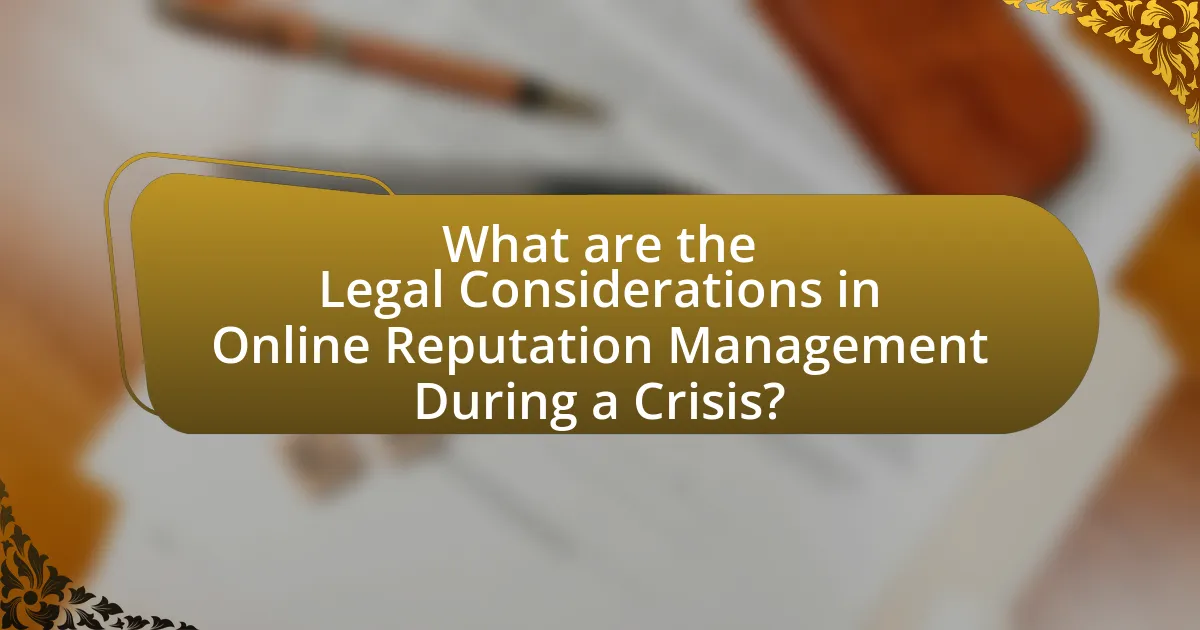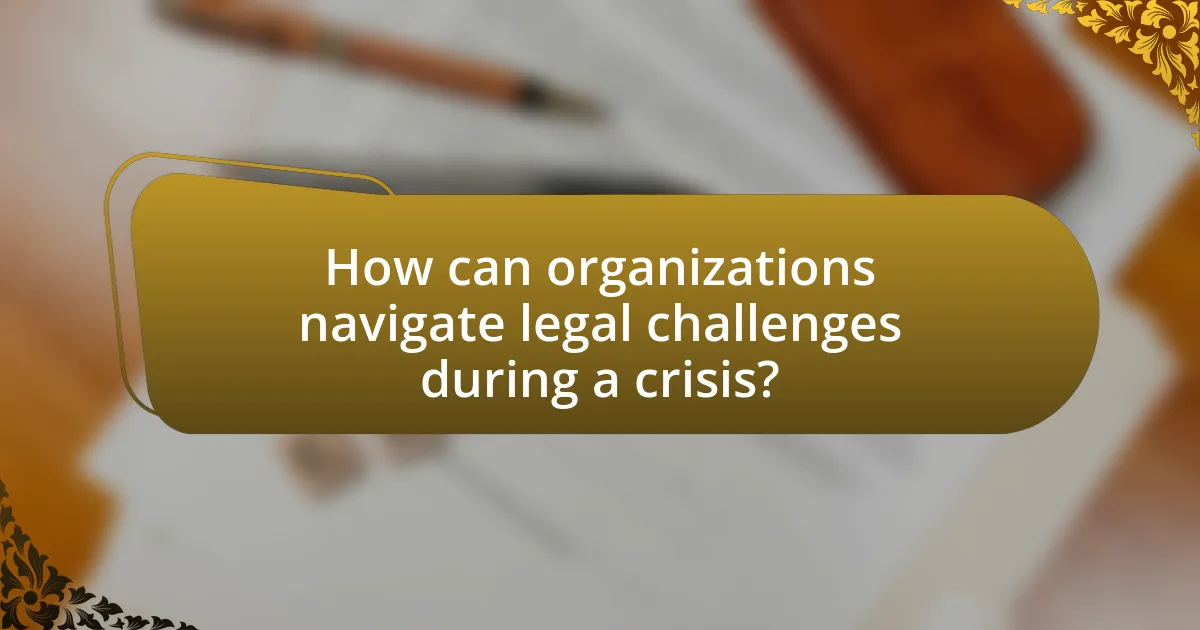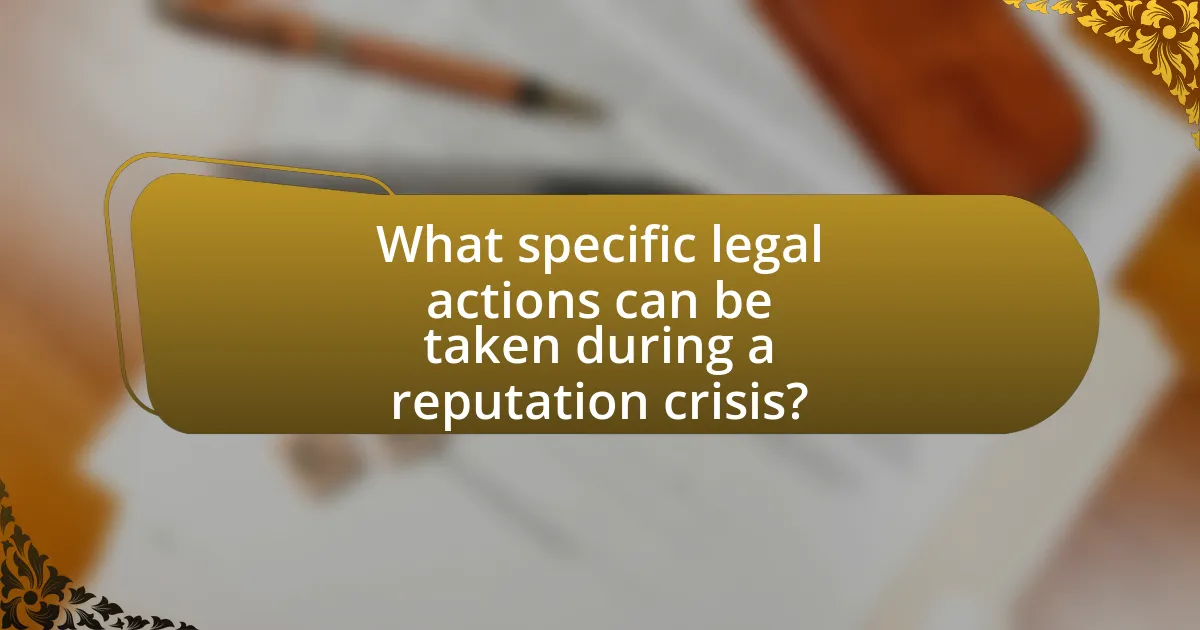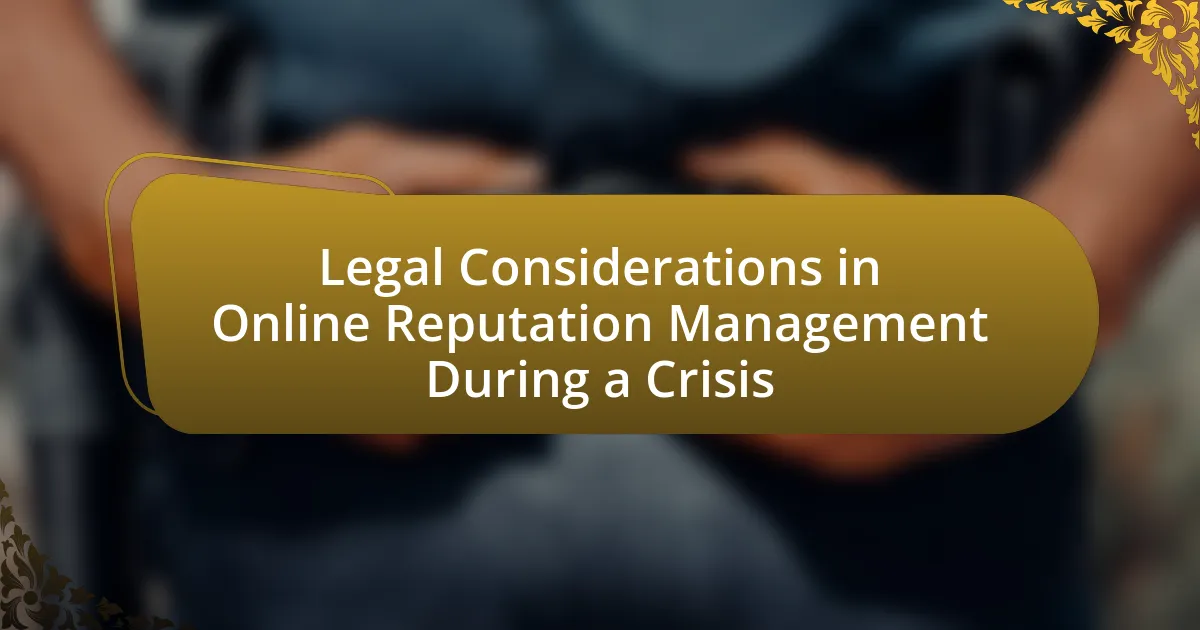The article focuses on the legal considerations in online reputation management during a crisis, emphasizing the importance of compliance with defamation laws, privacy regulations, and intellectual property rights. It outlines the potential legal risks organizations face, such as defamation and invasion of privacy, and discusses the varying legal frameworks across jurisdictions. Additionally, the article highlights the role of contracts, proactive communication, and legal counsel in navigating these challenges, while providing best practices for compliance and effective crisis management strategies. Overall, it underscores the necessity for organizations to understand and adhere to legal standards to protect their reputation and mitigate risks during crises.

What are the Legal Considerations in Online Reputation Management During a Crisis?
Legal considerations in online reputation management during a crisis include compliance with defamation laws, privacy regulations, and intellectual property rights. Organizations must ensure that any content they publish does not falsely harm the reputation of individuals or entities, as this could lead to legal action under defamation statutes. Additionally, they must respect privacy laws, such as the General Data Protection Regulation (GDPR) in Europe, which governs the handling of personal data. Furthermore, organizations should be cautious about using copyrighted material without permission, as this could result in copyright infringement claims. These legal frameworks are essential to navigate effectively to mitigate risks and protect both the organization and its stakeholders during a crisis.
Why is understanding legal considerations crucial in online reputation management?
Understanding legal considerations is crucial in online reputation management because it helps organizations navigate potential liabilities and protect their interests. Legal frameworks govern issues such as defamation, privacy rights, and intellectual property, which can significantly impact how a brand is perceived online. For instance, a study by the Pew Research Center indicates that 70% of individuals are concerned about their online privacy, highlighting the importance of adhering to legal standards to maintain trust. Additionally, failure to comply with laws can result in costly lawsuits and damage to reputation, making legal awareness essential for effective reputation management strategies.
What legal frameworks govern online reputation management?
The legal frameworks governing online reputation management include defamation law, privacy law, and intellectual property law. Defamation law protects individuals and organizations from false statements that harm their reputation, requiring proof of falsity and damages. Privacy law regulates the collection and dissemination of personal information, ensuring individuals have control over their data. Intellectual property law safeguards trademarks and copyrights, preventing unauthorized use that could damage a brand’s reputation. These frameworks collectively establish the legal boundaries within which online reputation management operates, ensuring compliance and protection for both individuals and businesses.
How do laws differ across jurisdictions in relation to online reputation?
Laws regarding online reputation differ significantly across jurisdictions, primarily due to variations in defamation laws, privacy regulations, and freedom of speech protections. For instance, in the United States, the First Amendment provides broad protections for free speech, making it more challenging to pursue defamation claims compared to countries like the United Kingdom, where the burden of proof often lies with the defendant and the laws are more favorable to claimants. Additionally, European jurisdictions enforce stricter privacy laws under the General Data Protection Regulation (GDPR), which can impact how online reputation is managed and protected. These differences highlight the necessity for individuals and organizations to understand the specific legal frameworks applicable in their respective jurisdictions when addressing online reputation issues.
What are the potential legal risks associated with online reputation management?
The potential legal risks associated with online reputation management include defamation, invasion of privacy, and violation of intellectual property rights. Defamation occurs when false statements are made about an individual or organization that harm their reputation, which can lead to lawsuits and financial damages. Invasion of privacy can arise from unauthorized use of personal information or images, potentially resulting in legal action. Additionally, online reputation management strategies that involve the use of copyrighted material without permission can lead to intellectual property disputes. These risks highlight the importance of adhering to legal standards and ethical practices in online reputation management.
What constitutes defamation in the context of online reputation?
Defamation in the context of online reputation occurs when false statements are made about an individual or entity that damage their reputation. For a statement to be considered defamatory, it must be presented as a fact, be untrue, and cause harm to the subject’s reputation. Legal standards for defamation vary by jurisdiction, but generally, the statement must be published to a third party, and the subject must be identifiable. In the United States, the plaintiff must also prove negligence or actual malice if the subject is a public figure, as established in the landmark case New York Times Co. v. Sullivan (1964). This case set a precedent that protects free speech while balancing the need to protect individuals from false and damaging statements.
How can privacy laws impact online reputation management strategies?
Privacy laws can significantly impact online reputation management strategies by restricting the collection and dissemination of personal data. These laws, such as the General Data Protection Regulation (GDPR) in Europe, mandate that organizations obtain explicit consent before processing personal information, which can limit the ability to monitor and respond to online mentions effectively. For instance, under GDPR, individuals have the right to request the removal of their personal data, which can hinder reputation management efforts if negative content is linked to identifiable individuals. Additionally, non-compliance with privacy laws can result in substantial fines, further complicating reputation management strategies as organizations must navigate legal risks while attempting to maintain a positive online presence.
What role do contracts and agreements play in online reputation management?
Contracts and agreements are essential in online reputation management as they establish clear expectations and responsibilities between parties involved. These legal documents can define the scope of services, confidentiality obligations, and dispute resolution processes, which are critical during a crisis. For instance, a contract with a reputation management firm may include clauses that specify how the firm will respond to negative reviews or misinformation, ensuring that both parties understand their roles in protecting the brand’s image. Additionally, agreements can provide legal recourse in case of breaches, thereby safeguarding the interests of the parties involved.
How can non-disclosure agreements protect reputation management efforts?
Non-disclosure agreements (NDAs) protect reputation management efforts by legally binding parties to confidentiality, thereby preventing the unauthorized sharing of sensitive information that could harm an organization’s reputation. By ensuring that employees, contractors, or partners cannot disclose negative information or internal issues, NDAs help maintain a controlled narrative during a crisis. For instance, a study by the International Association of Privacy Professionals indicates that organizations with robust confidentiality measures, including NDAs, experience 30% less reputational damage during crises compared to those without such protections. This demonstrates that NDAs are a critical tool in safeguarding an organization’s public image and mitigating potential fallout from negative disclosures.
What are the implications of service agreements with reputation management firms?
Service agreements with reputation management firms can significantly impact a business’s legal and operational landscape. These agreements typically outline the scope of services, confidentiality clauses, and liability limitations, which can affect how a company manages its online presence during a crisis. For instance, a well-defined service agreement can protect a business from potential legal repercussions by ensuring compliance with advertising laws and ethical standards in reputation management practices. Additionally, the agreement may include provisions for data protection, which is crucial given the increasing scrutiny on privacy regulations such as GDPR. Therefore, the implications of these agreements are profound, as they not only dictate the operational framework for managing reputation but also establish legal safeguards that can mitigate risks associated with online reputation crises.

How can organizations navigate legal challenges during a crisis?
Organizations can navigate legal challenges during a crisis by implementing proactive legal strategies and ensuring compliance with relevant laws. This involves consulting legal experts to assess risks, developing crisis management plans that include legal considerations, and maintaining transparent communication with stakeholders. For instance, during the COVID-19 pandemic, many organizations faced legal scrutiny regarding employee safety and contractual obligations, highlighting the importance of legal preparedness. By establishing clear protocols and engaging legal counsel, organizations can mitigate potential liabilities and protect their reputation effectively.
What strategies can be employed to mitigate legal risks?
To mitigate legal risks, organizations should implement comprehensive compliance programs, conduct regular risk assessments, and establish clear communication protocols. Compliance programs ensure adherence to relevant laws and regulations, reducing the likelihood of legal violations. Regular risk assessments identify potential legal vulnerabilities, allowing organizations to proactively address them. Clear communication protocols facilitate transparency and accountability, which can help in managing legal disputes effectively. For instance, a study by the Association of Corporate Counsel found that companies with robust compliance programs experience 50% fewer legal disputes, highlighting the effectiveness of these strategies in reducing legal risks.
How can proactive communication help in managing legal issues?
Proactive communication can significantly mitigate legal issues by fostering transparency and trust among stakeholders. When organizations engage in proactive communication, they can address potential concerns before they escalate into legal disputes, thereby reducing the likelihood of litigation. For instance, timely disclosures about issues can prevent misunderstandings and demonstrate accountability, which is crucial in legal contexts. Research indicates that companies that maintain open lines of communication during crises experience fewer legal challenges, as stakeholders feel informed and valued, leading to a more favorable perception of the organization.
What role does legal counsel play in crisis management?
Legal counsel plays a critical role in crisis management by providing guidance on legal implications and risk mitigation strategies. They assess potential legal liabilities, ensure compliance with regulations, and help formulate communication strategies that minimize legal exposure. For instance, during a data breach, legal counsel advises on notification requirements under laws such as the General Data Protection Regulation (GDPR) and helps manage public statements to avoid defamation claims. Their expertise is essential in navigating complex legal landscapes, thereby protecting the organization’s reputation and ensuring that responses to crises are legally sound.
What are the best practices for compliance in online reputation management?
The best practices for compliance in online reputation management include adhering to privacy laws, ensuring transparency in communications, and monitoring online content regularly. Organizations must comply with regulations such as the General Data Protection Regulation (GDPR) in Europe, which mandates the protection of personal data and privacy. Transparency is crucial; businesses should disclose their identity when responding to reviews or comments to maintain trust. Regular monitoring of online mentions allows organizations to address negative content promptly, mitigating potential legal risks. These practices help ensure that reputation management efforts align with legal standards and ethical considerations.
How can organizations ensure adherence to advertising and marketing laws?
Organizations can ensure adherence to advertising and marketing laws by implementing comprehensive compliance programs that include regular training, monitoring, and audits. These programs should educate employees about relevant laws such as the Federal Trade Commission Act, which prohibits deceptive advertising, and the CAN-SPAM Act, which regulates email marketing practices. Regular audits help identify potential compliance gaps, while monitoring advertising content ensures that it aligns with legal standards. Additionally, organizations should consult legal experts to stay updated on changes in advertising regulations, thereby reinforcing their commitment to lawful marketing practices.
What steps should be taken to maintain transparency and accountability?
To maintain transparency and accountability, organizations should implement clear communication strategies, establish regular reporting mechanisms, and engage stakeholders in decision-making processes. Clear communication strategies involve providing timely and accurate information to all relevant parties, ensuring that stakeholders are informed about actions and decisions. Regular reporting mechanisms, such as audits and performance reviews, help track progress and hold individuals accountable for their actions. Engaging stakeholders in decision-making processes fosters trust and allows for diverse perspectives, which enhances accountability. These steps are essential in legal considerations for online reputation management during a crisis, as they help mitigate risks and build credibility.

What specific legal actions can be taken during a reputation crisis?
During a reputation crisis, specific legal actions include filing defamation lawsuits, seeking injunctions to prevent further dissemination of false information, and pursuing cease-and-desist letters against individuals or entities spreading harmful content. Defamation lawsuits can be pursued when false statements harm an individual’s or organization’s reputation, as established in cases like New York Times Co. v. Sullivan, which set the standard for proving actual malice in public figure defamation. Injunctions can be effective in stopping the spread of damaging information, while cease-and-desist letters serve as formal requests to halt harmful actions, often leading to resolution without further legal action. These actions are grounded in established legal principles aimed at protecting reputation and mitigating damage during crises.
What legal remedies are available for defamation cases?
Legal remedies available for defamation cases include compensatory damages, punitive damages, and injunctive relief. Compensatory damages aim to reimburse the plaintiff for actual losses incurred due to the defamation, such as lost income or emotional distress. Punitive damages serve to punish the defendant for particularly harmful behavior and deter similar actions in the future. Injunctive relief may involve a court order requiring the defendant to cease the defamatory statements or retract them. These remedies are grounded in legal principles that protect individuals from false statements that harm their reputation.
How can cease and desist letters be effectively utilized?
Cease and desist letters can be effectively utilized as a formal means to demand the cessation of unlawful activities, such as copyright infringement or defamation. These letters serve as a clear communication tool that outlines the specific actions that are objectionable and the legal basis for the request, thereby establishing a record of the grievance. By including relevant legal statutes and potential consequences for non-compliance, such as litigation, the sender reinforces the seriousness of the matter. This approach not only aims to resolve the issue amicably but also provides a documented step that can be referenced in future legal proceedings if necessary.
What are the considerations for pursuing litigation in reputation management?
Pursuing litigation in reputation management requires careful consideration of several factors, including the strength of the defamation claim, the potential for damages, and the impact on public perception. A strong defamation claim must demonstrate that false statements were made, that they caused harm, and that the statements were not protected by free speech laws. The potential for damages includes not only financial compensation but also the possibility of injunctive relief to prevent further harm. Additionally, the decision to litigate can influence public perception; aggressive legal action may draw more attention to the negative information, while a more measured response may mitigate further damage. These considerations are crucial for effectively navigating the complexities of reputation management in a legal context.
How can organizations effectively respond to legal threats during a crisis?
Organizations can effectively respond to legal threats during a crisis by implementing a proactive legal strategy that includes immediate assessment, communication, and collaboration with legal counsel. This approach ensures that organizations can identify potential legal risks early, allowing them to formulate a response that mitigates liability and protects their reputation. For instance, a study by the Harvard Business Review highlights that companies that engage legal teams during the initial stages of a crisis are 30% more likely to manage reputational damage successfully. By maintaining open lines of communication with stakeholders and ensuring compliance with legal obligations, organizations can navigate crises more effectively while safeguarding their interests.
What communication strategies should be employed when facing legal challenges?
When facing legal challenges, organizations should employ clear, transparent, and consistent communication strategies. Clear communication involves articulating the situation and the organization’s position without ambiguity, which helps to build trust with stakeholders. Transparency is crucial; organizations must disclose relevant information to avoid speculation and misinformation, as seen in cases like the Johnson & Johnson Tylenol crisis, where timely updates helped maintain public trust. Consistency in messaging across all platforms ensures that stakeholders receive the same information, reducing confusion and reinforcing credibility. Additionally, engaging legal counsel to guide communication can prevent potential legal pitfalls and ensure compliance with regulations.
How can organizations leverage public relations to manage legal perceptions?
Organizations can leverage public relations to manage legal perceptions by proactively communicating transparent information about legal issues and engaging with stakeholders to build trust. Effective public relations strategies include crafting clear messaging that addresses legal challenges, utilizing media channels to disseminate accurate information, and responding promptly to misinformation. For instance, during high-profile legal cases, organizations that maintain open lines of communication and provide regular updates can mitigate negative perceptions and reinforce their commitment to compliance and ethical standards. Research indicates that organizations with strong public relations efforts during legal crises experience less reputational damage, as seen in cases like the Johnson & Johnson Tylenol crisis, where timely communication helped restore public trust.
What practical tips can organizations follow for effective online reputation management during a crisis?
Organizations can effectively manage their online reputation during a crisis by implementing a proactive communication strategy. This involves promptly addressing the issue through transparent and consistent messaging across all platforms. For instance, a study by the Institute for Crisis Management found that organizations that respond quickly to crises can reduce negative sentiment by up to 50%. Additionally, monitoring social media and online mentions allows organizations to gauge public perception and respond to misinformation swiftly. Engaging with stakeholders and providing regular updates fosters trust and demonstrates accountability. Furthermore, having a crisis management plan in place, which includes designated spokespersons and pre-prepared statements, ensures that responses are coordinated and effective.

Leave a Reply